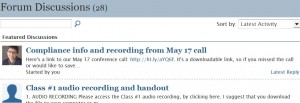Gil Weinreich and I had a great conversation about the importance to advisors of good writing when he interviewed me for an article about email that appeared on AdvisorOne. I’m delighted that I convinced him to share his thoughts in this guest post.
Good Writing is Good for Business
By Gil Weinreich
More than 15 years of financial journalism experience have convinced me that a high proportion of financial services industry professionals – be they corporate executives or retail financial advisors – are poor communicators.
I recall one broker, who expensively branded around the motto “I value every sale.” Of course you do. Each sale makes you richer. But what does it do for me?
That is typical of an inability to imaginatively penetrate the deep-seated concerns of clients, who are looking for someone they can trust to help manage their personal finances, not a parasite to feed off their hard-earned assets.
Another common communications flaw is self-important verbosity, which gives the appearance that the writer was hoping a quantity of words would somehow give the impression of quality: “We help clients achieve their investment goals and objectives in light of their various needs and circumstances through ongoing consultation and periodic reviews.”
Just one of each pair (i.e., goals or objectives, needs or circumstances, consultation or periodic review) would do, and a competent writer could embellish each of these subjects rather than numb readers’ interest through repetition.
Poorly thought out word choices is another common malady: “From today’s needs to tomorrow’s goals, we will guide you on your financial path.” But most clients want to discuss today’s goals and tomorrow’s needs.
An asset manager executive once shared with me some shareholder newsletters that were uniformly ponderous, numeric and insipid. What the firm needed, I advised, was to find a capable person with investment knowledge but also literary skill to be put in charge of these communications. What they needed, in short, was a Chief Literary Officer.
The firm’s principals, all MBAs, nodded their approval, but it was clear they didn’t really get it since it violated all their business-school biases. They eventually hired a marketer – though, the firm already had marketers on staff – to oversee their investment communications. Years later, the firm has not grown much in assets under management and their communications do not appear to have much improved.
And that’s the thing of it. It’s hard to stand out in a crowded marketplace when you look, act, think, speak and write like all your competitors. Part of what B-school is about is making money, and financial professionals often, unwittingly, convey the impression that they make money from you rather than for you. Missing is insight into how to connect with customers, clients or prospects on a deeper level. And that is a task that requires broadmindedness and communications expertise.
Kyle Wiens, founder of two high-tech start-ups iFixit and Dozuki, requires all his employees, even salespeople and operations staff, to pass a grammar test as a condition of employment.
Writing in the July issue of the Harvard Business Review, Wiens says:
“If it takes someone more than 20 years to notice how to properly use “it’s,” then that’s not a learning curve I’m comfortable with. So, even in this hyper-competitive market, I will pass on a great programmer who cannot write.”
Poor grammar in financial communications leaves a bad impression, to be sure. But more than that, literarily accomplished financial communications can impress prospects and clients in ways that your average salesperson may not be able to achieve (but which he or she will find to be an indispensable aid). Simply put, good writing –especially because it is increasingly rare — is good for business.
——————
Gil Weinreich is the editor of Research magazine and a daily contributor to AdvisorOne, financial advisor-targeted publications owned by Summit Business Media. He can be reached at gweinreich@sbmedia.com.






